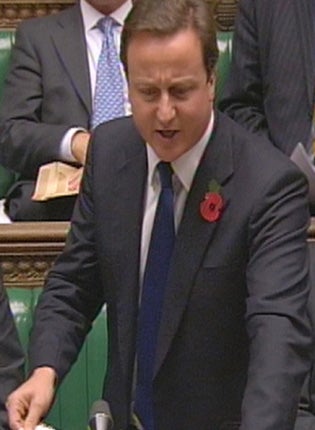Cameron admits U-turn on Lisbon
Eurosceptics furious over Tory leader's decision not to hold referendum

Your support helps us to tell the story
From reproductive rights to climate change to Big Tech, The Independent is on the ground when the story is developing. Whether it's investigating the financials of Elon Musk's pro-Trump PAC or producing our latest documentary, 'The A Word', which shines a light on the American women fighting for reproductive rights, we know how important it is to parse out the facts from the messaging.
At such a critical moment in US history, we need reporters on the ground. Your donation allows us to keep sending journalists to speak to both sides of the story.
The Independent is trusted by Americans across the entire political spectrum. And unlike many other quality news outlets, we choose not to lock Americans out of our reporting and analysis with paywalls. We believe quality journalism should be available to everyone, paid for by those who can afford it.
Your support makes all the difference.David Cameron has admitted his party is unlikely to be able to hold a promised referendum on the Lisbon Treaty once it has become law, paving the way for a policy U-turn that will infuriate Tory Eurosceptics.
Only the Czech Republic is yet to sign off the document, which is fiercely opposed by many Tory MPs. Vaclav Klaus, the Czech President, is expected to sign the treaty should its constitutional court decide that it does not violate Czech law. The ruling is expected today.
Mr Cameron said that his party would "do what we can to make good all our promises", but finally conceded that a chance to hold a vote on the treaty was fading rapidly. It is widely anticipated that he will soon formally announce that a Conservative government will not hold a referendum, despite giving the public a "cast-iron guarantee" in 2007 that they would be given a vote on the treaty.
"What I said is that we would hold that referendum on the Lisbon Treaty but it seems we are getting close to a point when it is part of European law," he said. "I had always hoped that President Klaus wouldn't sign but it seems that times are changing."
Mr Cameron's team are well aware that his refusal to answer questions on his party's future policy should the treaty be ratified is beginning to damage his credibility. "It is clear that times are changing," said a spokeswoman. "The ruling by the Czech court is obviously an important moment."
Yesterday one senior backbencher broke ranks by demanding a referendum on the Lisbon Treaty, even if it had been ratified by the time Mr Cameron entered No 10. Bill Cash, the Tory MP for Stone and a prominent Eurosceptic, called for Mr Cameron to hold a referendum with "no ifs or buts". He said that any move to replace the pledge with a promise to renegotiate some of the changes the treaty brings about would not be acceptable.
"As David Cameron has said, we need an association of member states. In order to achieve this, we cannot simply cherry-pick individual aspects of the treaty and call for renegotiation of those," he said. "We need a full referendum on Lisbon as we were promised and as we voted in the House of Commons. This is about the Government of the United Kingdom operating in line with the democratic wishes of the electorate."
The Bruges Group, a Eurosceptic think-tank popular among Tory backbenchers, also warned that simply renegotiating Britain's involvement in the treaty would be "incoherent, disingenuous and utterly unconvincing".
"What is the point in David Cameron upending one pledge on Europe but promising he'll offer us yet more European promises in his general election manifesto?" asked the group's co-chairman, the former Tory MP, Barry Legg. "Why will they be any more credible than the 'cast-iron guarantee' he has just broken?"
Some MPs are now calling on Mr Cameron to live up to his promise for a referendum by giving the public a chance to vote on an even wider issue of Britain's involvement with the EU. Philip Davies, the Tory MP for Shipley, said: "I would like to see a referendum on our relationship with the EU. The public has been promised one, and I think it falls to us to give people some kind of say that they have been denied so far."
Meanwhile, Downing Street said yesterday that Gordon Brown would continue to campaign for Tony Blair to be handed the position of EU President, despite an apparent lack of support for the former prime minister at a Brussels summit last week. "The Prime Minister is four if not five-square behind him," said Mr Brown's spokesman.
Join our commenting forum
Join thought-provoking conversations, follow other Independent readers and see their replies
Comments